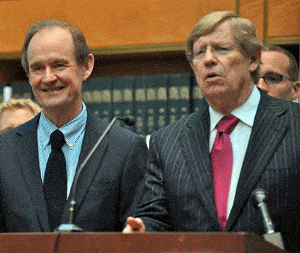SCOTUSBlog, a blog dedicated to discussing constitutional issues before the Supreme Court, is conducting an online symposium on Perry, Proposition 8, the Defense of Marriage Act, Windsor v. United States and other LGBT rights issues. It's worth a read, when you a have a moment.
In his post, Professor Thomas Berg of the University of St. Thomas argues that courts are institutionally incapable of balancing the gay community's interest in marriage rights and traditionalists' interest in religious liberty. He argues that
 Like Judge Walker, the California Supreme Court in In re Marriage Cases (2008) found that same-sex civil marriage “will not impinge upon the religious freedom of” anyone, for two reasons: “no religion will be required to change its religious policies or practices with regard to same-sex couples, and no religious officiant will be required to solemnize a marriage in contravention of his or her religious beliefs.”
Like Judge Walker, the California Supreme Court in In re Marriage Cases (2008) found that same-sex civil marriage “will not impinge upon the religious freedom of” anyone, for two reasons: “no religion will be required to change its religious policies or practices with regard to same-sex couples, and no religious officiant will be required to solemnize a marriage in contravention of his or her religious beliefs.”
Professor Berg finds this reasoning inadequate because simply stating that religions will not have to change their practices "overlooks the reach of antidiscrimination and public-accommodations laws," and restricting focus to officiants "limits religious-freedom concerns to the church ceremony and the clergyperson." He is concerned about the photographer, the wedding planner, the convention hall owner and other private individuals who refuse to grant equal access because of their personal religious beliefs.
This concern is most notable when a court legalizes gay marriage (as in California in In re Marriage Cases) rather than New York, where a legislature legalized the practice. According to Professor Berg, courts are incapable of creating balanced laws that reflect competing interests — instead, courts answer narrow legal and factual questions before them; legislatures craft policy. The California Supreme Court did this, the argument goes, before Proposition 8. It legalized same-sex marriage without legislation that protected religious liberty. As such, the voters could have rationally decided that same-sex marriage as constructed in California was wrong (which would make Prop 8 constitutional under a rational basis standard).
Professor Berg's argument seems reasonable, but I disagree. Let's discuss how AFTER THE JUMP.
There are three reasons why Professor Berg's argument does not quite come full circle.
First, the suggestion that marriage rights have to be balanced equally with religious rights, in general, assumes the value judgment that those rights are of equal weight. In this way, Professor Berg, like many colleagues influenced by the classical liberal (lowercase "l") foundations of our constitutional and legal philosophy, suggests that individuated rights are the central values in the Constitution, leaving little guidance on how to mediate between those rights. I do not believe that to be the case, but even if I concede the philosophical point, American society has already proved him wrong. As I have argued here, the pervasive existence of public accommodations laws that ban this type of discrimination manifests the public's judgment that cooperation and equality are more important to us than radically individuated religious observance.
Second, even if you do not believe that our society has made that value judgment — it is indeed up for debate — there is a qualitative difference between a right of inclusion and a right of exclusion. In re Marriage Cases and the Massachusetts same-sex marriage decision, Goodridge v. Department of Public Health, included the gay community in the institution of marriage; religious exceptions to such inclusion excludes the gay community from public accommodations. Normally, exceptions to default rules require special justification. They are rarely of equal value to the basic right in question. And, they are meant to be narrow. Professor Berg would extend the right to exclude the gay community from public accommodations to anyone who follows a conservative religious ideology, significantly expanding the orbit of discrimination.
Third, it makes no sense that Prop 8 — the ban on same-sex marriage in California — was a rational public response to a California Supreme Court decision (In re Marriage Cases) that inadequately protected religious liberty. Professor Berg cites from an amicus brief from the Becket Fund for Religious Liberty argued in Perry: "Since the California Supreme Court left Californians with an all-or-nothing choice between same-sex marriage and full protection for the rights of conscience, Proposition 8 was an entirely rational response to the threat to religious liberty." No, it wasn't. A rational response would have been an initiative (assuming we needed an initiative) that codified religious exemptions to default marriage recognition. If the problem was the lack of religious protection, then the solution to the problem was to add religious protections, not overturn the entire law. Prop 8 was an overreaction, and thus an irrational reaction.
Professor Berg is not wrong about the relative institutional abilities of courts and legislatures: it is certainly harder for courts to adequately craft rules that balance competing interests. But, that does not mean that Prop 8's discriminatory ban on the entire institution of same-sex marriage was a rational response to a much more narrow problem.
***
Ari Ezra Waldman is a 2002 graduate of Harvard College and a 2005 graduate of Harvard Law School. After practicing in New York for five years and clerking at a federal appellate court in Washington, D.C., Ari is now on the faculty at California Western School of Law in San Diego, California. His research focuses on gay rights and the First Amendment. Ari will be writing weekly posts on law and various LGBT issues.
Follow Ari on Twitter at @ariezrawaldman.



